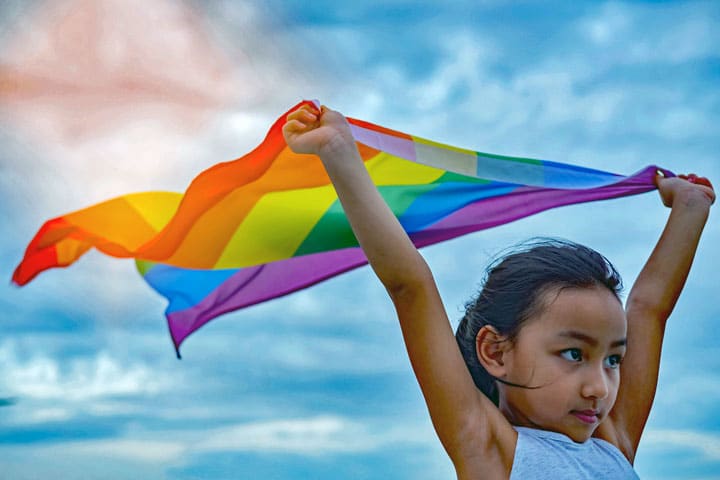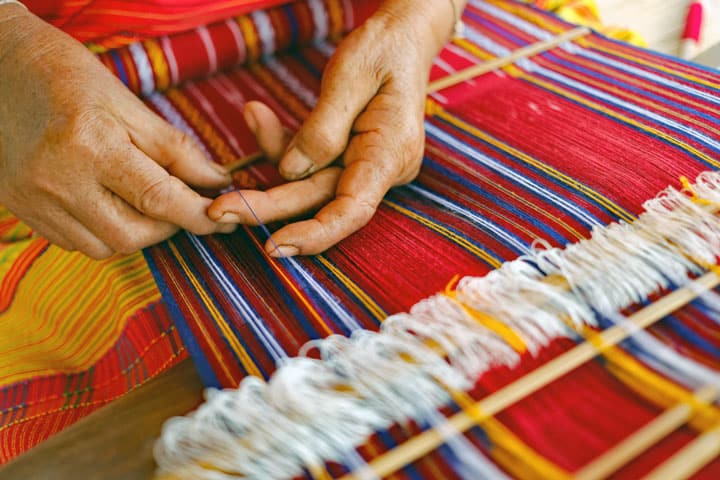You-Me-We-Us: 'We weave the rainbow'

The village of Mae Sam Laep is located in Sop Moei District of Mae Hong Son Province. The community consists of indigenous groups such as the Tai Yai, Karen and some Muslims. The village is located on the border of Thailand with Myanmar, the Kayin / Karen state, where armed conflicts between the Karen and the Myanmar army have led to people fleeing.
Because Thailand does not recognize these indigenous people as citizens, they are not entitled to legal protection. Human rights have been violated such as, for example, the right to land, the right to live in the forests and access to facilities. Even worse, the village was declared a national park, forcing residents to build their homes in areas vulnerable to flooding, landslide and wildfire.
Some people have no nationality at all, which limits their ability to travel, to look for a job or training, and to become an entrepreneur. The result: the residents of Baan Mae Sam Laep are penniless. Women and the LGBTIQ youth experience gender-based violence. And Covid-19 has only exacerbated this.
But now the ladies can weave
Mrs Chermapo (28): 'I am proud. I can't believe it myself that I can weave these beautiful Karen rainbow products. Weaving makes me happy. Every time I am weaving, my children come to see me. It's an opportunity to teach them and talk to them. In addition, now that I am very active in weaving and become the sole breadwinner in the family, my husband, who is also stateless and unemployed, can help with the housework. I can spend more time weaving that way.'

Mrs. Aeveena (27): 'I am stateless and could not find a job. I sat at home day in and day out and took care of my child. My main concern was how to get money for food and to buy something tasty for my child. But after I received training and became part of the 'Indigenous Youth for Sustainable Development' and the 'Karen Rainbow Textile Social Enterprise Project' I have gained skills and knowledge, hope and courage, and income.
I can buy my child some treats and other things I want. Got the first pair of nice shoes for myself. I start to feel meaningful and valuable. My husband helps with the housework while I weave. What's more, he actively supports me to learn even more and fully participate in the project.'
Finally, Mrs. Portu (39): 'I could never study because since I was a child I had to flee from war. Even now, as I am older, that war is not over. Many people in the village live in fear because of the war, but it has also destroyed our weaving knowledge and culture. Not even my mother has that knowledge anymore.
But since I joined the Indigenous Youth for Sustainable Development and the Karen Rainbow Textile Social Enterprise Project, where the women of the village help each other to learn the weaving technique, I can weave and have an income to support my family. to support. I have money to buy school shoes for my child. And, more importantly, I have money and a job. That helps when my husband and I have to make decisions together.'
The objectives
The project aims to solve poverty in a collaborative and environmentally friendly way with a focus on empowering stateless Indigenous women and LGBTIQ youth so that:
- They gain understanding and knowledge about human rights, gender equality and gender equality,
- They can lead the Karen rainbow woven textiles project and have the skills and knowledge to do so and also own it, and
- That they can develop knowledge and craftsmanship to weave the Karen rainbow textiles, as a continuation of the old, indigenous Karen culture.
If all this succeeds, the Karen rainbow woven textiles business will not only increase the status and income of women, but also solve the poverty and gender inequality of stateless indigenous women and the LGBTIQ youth.
Source: https://you-me-we-us.com/story-view Translation and editing Erik Kuijpers. The text has been shortened.
Authors and at the loom: Aeveena & Portu & Chermapo
of the organization Indigenous Youth for Sustainable Development (OY4SD). Also on behalf of 'The Karen Rainbow Textile Social Enterprise', an enterprise to address poverty in a collaborative and responsible manner by LGBTIQ youth and stateless Indigenous women.
Photos of their work can be found here: https://you-me-we-us.com/story/the-karen-rainbow-textiles
The attentive reader has noticed that number 26 has been skipped. It is about the integration of the Thai language in an area that speaks Khmer dialects. The text is very long so for that article I refer you to this link: https://you-me-we-us.com/story/the-memories-of-my-khmer-roots


What a sickening injustice reigns in some places on our planet.
Sad stories with some hope. As the site itself indicates, the Karen, especially the women and LGBTIQ, are quite hard to endure. Covid adds another shovel to that. By making flags and rainbow fabrics, stateless people, among others, still have an income and it makes people more resilient, more self-reliant and with more self-confidence. In short: more fully-fledged human beings (and someday citizens??).
I hate that inequality!
I live in belgium. How can I help those people?
Vi Mat, individually if you are there and buy their woven things. That is immediately cash in their hands and they benefit from it.
But structural aid is of course much better and the text already mentions two organizations that help there.